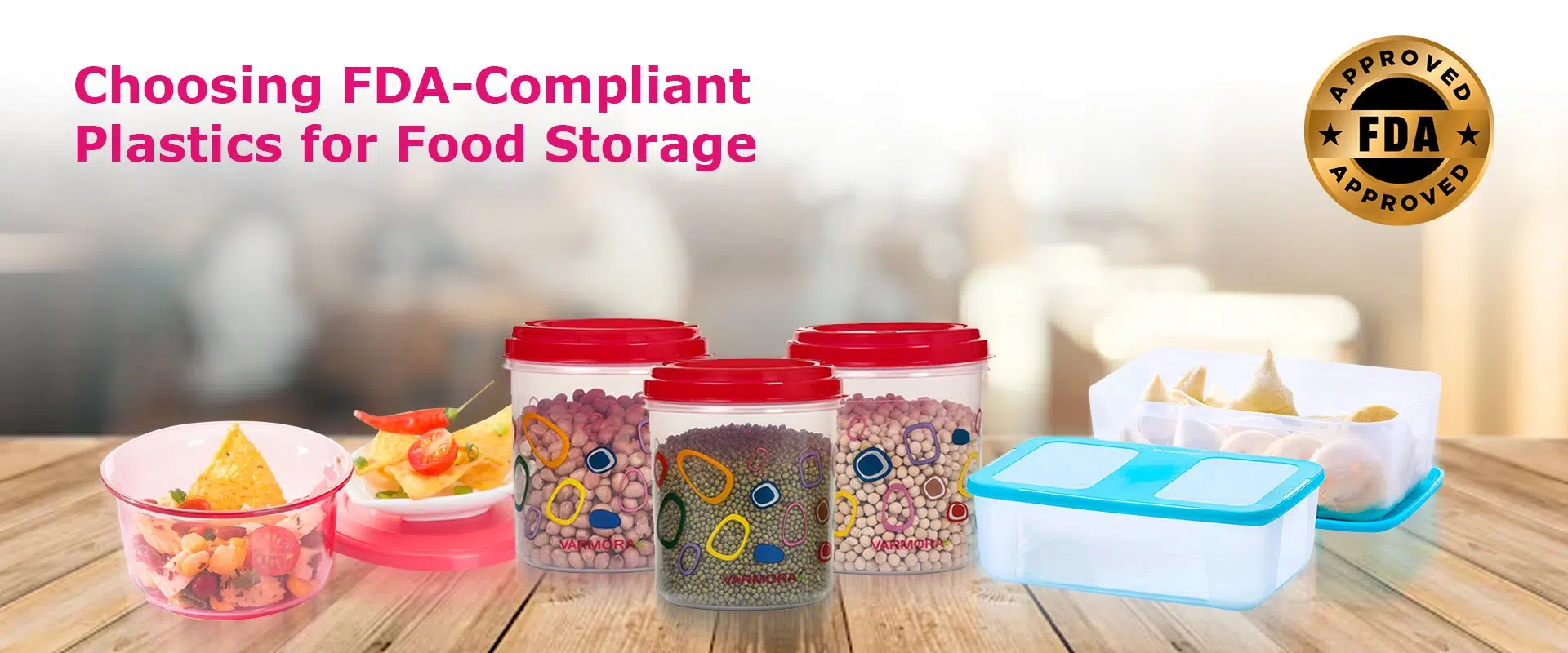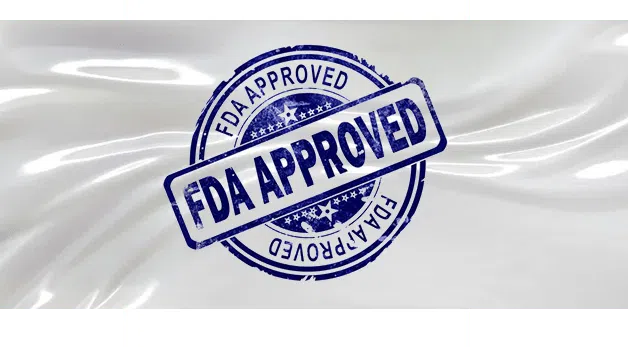Blog Highlight: Learn why FDA-compliant plastics are for safe food storage. Explore tips and guidelines for choosing the best plastic containers for your kitchen needs.
Plastic is a controversial material when it comes to food storage. This is because the majority of plastics are unsafe for food storage as there is a possibility that harmful chemicals like BPA can leach into the stored food.
This is where FDA-compliant plastics come in the spotlight. The Food and Drug Administration (USA) is a body that governs the safe use of materials intended for, or for storing food meant for human consumption.
The FDA lays out certain rules when it comes to manufacturing plastic containers, and the standards set by them ensure the general public has access to safe plastics.
Understanding FDA Standards
The FDA is a governing body for materials that come into contact with food. This ensures the materials are safe for human consumption. When it comes to plastic containers, the FDA has a set of clear guidelines that manufacturers of plastic containers are expected to follow when manufacturing their products.
This includes the type of plastic used for manufacturing, along with the addition of other substances. Some of the key standards set by the FDA are mentioned below.
1. Food Contact Notifications
Manufacturers of plastic containers have to submit an FCN or Food Contact Notification to the FDA to ensure the substance they are manufacturing is safe for human use.
2. Food Additive Regulations
The FDA also has a list of approved additives that can be used for materials that come in contact with food. Thus, any additives used in plastic container manufacturing need to comply with these regulations.
3. Good Manufacturing Practices
GMP as it is more commonly known is a standard that manufacturers of plastic containers need to comply with to ensure the products are consistent in quality and safety.
4. Regulations for plastic
The FDA also has regulations for certain types of plastics that are used for storing food, like PET and PP.
FDA-approved plastic and its importance in food storage
There are several different types of plastics that are certified as safe for food storage by the FDA. These types of plastic won’t leach harmful chemicals into any food item stored in these containers. Thus, FDA-approved plastics can be safely used for storing food in households, retail food packaging and even commercial establishments.
Below, we have discussed some of the different types of plastics that are certified as safe for food storage by the FDA.
 PET/PETE (Polyethylene Terephthalate)
PET/PETE (Polyethylene Terephthalate)
This is a type of plastic that is commonly used for manufacturing plastic beverage containers and jars. You can find them being used for storing large sodas, peanut butter, dips and salad dressings, and more. PET also repels the growth of microorganisms and doesn’t corrode. This makes it one of the ideal types of plastic for food and beverage storage.
 HDPE (High-Density Polyethylene)
HDPE (High-Density Polyethylene)
This is one of the most common types of plastic used for manufacturing household items. It is used for making butter containers, cereal containers, thick food storage buckets and even beverage bottles. HDPE is also a highly recyclable plastic and thus, is environment friendly.
 LDPE (Low-Density Polyethylene)
LDPE (Low-Density Polyethylene)
LDPE is a lot similar to HDPE. However, it is less rigid which makes it perfect for bottles that need to be squeezed, like sauce bottles, plastic film like six-pack rings, cling wrap, and much more. It is resistant to chemicals and also repels microorganisms.
 PP (Polypropylene)
PP (Polypropylene)
Polypropylene is a type of plastic that is used for manufacturing single-serve containers. Examples of these types of plastic include yoghurt containers, ice cream cups, sauce sachets, etc. Moreover, PP is microwave-safe and also non-volatile. Thus, it won’t react with any kind of food you store inside it, be it acidic, liquid or base.
Plastics Not Recommended for Food Storage
There are also certain types of plastics that are not recommended for food storage by the FDA. These types of plastic may leach harmful chemicals inside the food stored in them, or can also change their state.
Some of these plastics are mentioned below.
1. PVC (Polyvinyl Chloride)
PVC is a type of plastic polymer that is versatile, durable and also affordable. However, PVC is not recommended for food storage as it contains certain additives like stabilizers, plasticizers and lubricants that may leach into food. Moreover, PVC has also been found to contain phthalates which are associated with several adverse health effects, like development toxicity and reproductive disorders.
2. PS (Polystyrene)
Polystyrene is a type of a synthetic polymer that is used for various applications since it is lightweight, has a rigid structure and also has insulating properties. However, like PVC, Polystyrene has certain concerns when it comes to food storage. This is because it contains additives like styrene monomer and other types of stabilizers that can potentially leach into food, especially when exposed to heat.
Varmora’s commitment to FDA compliance
Varmora Plastech understands the risks that toxic plastic can pose to consumers. This is why our entire range of plastic containers is made with FDA-certified plastic that is absolutely safe for food storage.
Moreover, our plastic containers are engineered to be of the highest quality, ensuring you have complete peace of mind when it comes to storing food items. Our plastic containers are BPA-free, microwave safe, dishwasher and freezer-safe, and are the best option available when it comes to storing food in a safe, secure and non-toxic way.
Oh, and did we mention, they come with air-tight seals for extended freshness?
So, the next time you are on the market looking to buy plastic containers for food storage, do give our containers a try. We are sure you won’t be disappointed.
Final Thoughts
It is important that you choose the right type of plastic containers for storing your food items. This is because the market is flooded with options and not every container you buy will actually be food-safe.
So, trust Varmora when it comes to food storage containers and make the right choice for yourself and your family.
When you invest in Varmora, you invest in food safety, security and your health. So, head over to our website and start shopping now!
FAQ
Q1. What does it mean when a food product is FDA-approved?
FDA-approval for a food product means it is safe for human consumption. If you are using a FDA-approved plastic container for storing your food, then you are making the right choice for yourself and your family. A FDA-approved plastic container will not contain harmful chemicals like BPA and also won’t leach any chemicals in your food.
Q2. Does it matter if something is FDA-approved?
Of course, since an FDA-approval is coveted, and hard to get. Thus, if a food product is FDA-approved, it means it has undergone rigorous testing to ensure it is absolutely safe for food storage. For most food storage container manufacturers, an FDA-approval is like a hallmark of quality and safety.
Q3. Which type of plastic is safe to use?
Plastics like PET, HDPE, LDPE and PP are safe for food storage. These types of plastics don’t contain any harmful chemicals and also won’t leach any chemicals into the food you store. So, make sure the plastic container you buy is made from these types of plastics.
Q4. Which plastic should not be used?
Plastics like PVC and PS are unsafe for storing food items. This is because plastics like these are manufactured using certain chemicals that may leach into food and can cause severe adverse health effects. Thus, it is better to stay away from such plastics and use FDA-approved plastics only.


